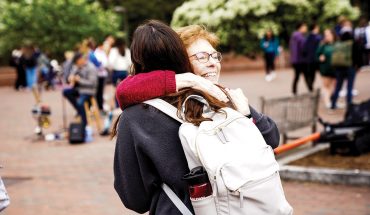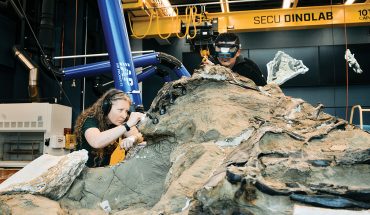
Global Luxury Management (GLM) graduate student Daniel Hale watches a presentation by Nordstrom to GLM and MBA students at Nelson Hall in the Jenkins Graduate School and Poole College of Management at N.C. State.
Training ground: Raleigh
by Jessie Ammons
photographs by Justin Cook
In one of N.C. State’s sleek Centennial Campus buildings, 42 graduate students study a pyramid graphic on a screen in front of them. The pyramid illustrates the upper echelon of the world’s consumer wealth: the large bottom tier includes the top four percent of U.S. households, and the very top tier refers to billionaires, which represent just a few thousand people worldwide and only a few hundred Americans. “That is the target customer,” says Ellen Rohde, a former apparel and textile industry strategist who now serves as the industry liaison for the Global Luxury Management (GLM) program at N.C. State. “That is who you’re here to learn about.”

Derek Keller, Assistant Director of MBA and MGIM programs, and Dr. Nancy Cassill, director of the GLM program, at the College of Textiles at N.C. State.
It’s day one of the yearlong GLM program, a partnership between the Poole College of Management and the France-based international business school SKEMA. Students often come in straight from undergrad with degrees in textiles, marketing, or communications, eager to hone their skills in top-end brand management. Usually, they have personal luxury in mind: apparel, accessories, cosmetics. What they quickly learn is that “there are so many more aspects of luxury,” says Dr. Nancy Cassill, the program’s director. When you talk about the top one percent of America’s wealthy, students learn, you go beyond an expensive jacket and consider transportation – cars, planes, yachts – and experiential products – homes, real estate, art, travel destinations.
High-end goods need development and strategy, networking on a worldwide scale. And the perfect training ground, as it turns out, is Raleigh.
Happy medium
“Raleigh is not yet a primary market as is a New York, a Boston, a Washington, D.C.,” admits Jim Beley, general manager of the Umstead Hotel and Spa. Beley is a member of the GLM program’s industry advisory board and has worked with the graduate students since the program’s inception three years ago. His clients and guests at the Umstead are perhaps closer to that top one percent target slice than most other establishments in the Triangle, and Beley believes the city is on the cusp of becoming a heavy-hitter in the luxury market. “With what’s happening in the arts, in the tech quarter, and with growth in industries like pharmaceuticals – luxury demands will continue to expand throughout the Triangle.”
Even so, why base a global luxury management program here, on the edge of – rather than in the heart of – it all? Dr. Cassill points out that the supply side of the business thrives here. “Raleigh’s proximity to markets like Pinehurst – luxury golf – and High Point – quality furniture – are hard to beat,” she says. It’s that kind of accessibility that qualifies this city as a “credible source for luxury industry knowledge.”
“It makes sense when you dig a little bit deeper,” says program assistant director Derek Keller. “Raleigh is a happy medium.” The SKEMA partnership means the GLM student population is internationally diverse: Students hail from France, China, Spain, Romania. “International students are out of their comfort zone here, but not so far out of their comfort zone that they’re going to lose the focus on their learning. The university is large, but Raleigh is still easy to maneuver.”
Mary Beth Miller, 26, who graduates this month, says the GLM program’s Raleigh location appealed to her over other post-grad opportunities in larger cities. “It takes you out of the craziness of New York and gets you down to the core, the nitty-gritty of the industry.”
A small dot
The luxury industry is fundamentally limited, given that its consumers represent a small but mighty sliver of the population. That Raleigh is even part of the conversation – given nearby metropolises like Charlotte and Atlanta – is significant. On the luxury map, “we’re not necessarily a big dot, but we’re one of the small dots,” Keller says. The GLM program is evidence of that.
“Luxury captures culture,” explains Anna Reynolds, a GLM grad who now works in high-end pharmaceutical brand management for the German-owned company Merz. It’s one of the unexpected aspects of the luxury market that it exists even in an industry like pharmaceuticals. Reynolds works at the North American headquarters, a newly renovated, light-filled space off of Six Forks Road in North Raleigh.
“I don’t see Louis Vuitton having a store in Raleigh; I don’t see Burberry having a store in Raleigh,” Reynolds says. “I see it more as an independently grown luxury community through local businesses, like Raleigh Denim and Lumina” clothing. Or Peter Millar clothing; Louise Gaskill lighting; Stitch golf bags; custom jewelers like Karen Hemphill, Booth, or Gabe Bratton; fashion designer Justin LeBlanc; or distilleries like TOPO, Durham Distillery, or Krupnikas.
Another example is the GLM program’s own assistant director. Keller also designs and makes leather goods and men’s accessories under the brand name 440 Gentleman Supply. “It was sort of a hobby-turned-business,” he says. The opportunity for a custom men’s line occurred to him as he networked on behalf of his students.
Southern hospitality
Miller sees Raleigh excelling at the intersection of niche luxury and personal connection. “That’s what Raleigh is all about: you feel like part of a community, and then you’re willing to pay for their product.”
Indulgence with a dose of Southern hospitality: If luxury reflects culture, Raleigh is traditional and inviting, but also open-minded and energetic.
The task of the GLM program graduates, then, is to take what they learn here while still keeping pace with the broader industry’s cutting edge. Because the program takes its students far afield, it’s easier to stay on the forefront. Students spend a semester here at N.C. State and a semester at the SKEMA campus in France before graduating with two degrees: a masters in global innovation with a concentration in luxury management from N.C. State, and a masters in luxury and fashion from SKEMA.
Katie Sousa graduated last year from the GLM program and now works at The Luxury Institute in New York, where she helps clients “transform into high-performance relationship builders” in their storefronts and customer interactions. Sousa says colleagues frequently balk when they discover her degree was earned in Raleigh, N.C..
But she’s quick to spell it out for them. “In this industry, we talk about inclusivity a lot: It’s not about being exclusive as a luxury client, it’s about being inclusive. You’re not loud; you’re not flashy; no one may know that you have money in the bank. It’s the person dressed in jeans, wearing New Balances, but who might have a Hermès wallet with Porsches in the driveway. Quiet luxury is the direction we’re going.” And Raleigh exemplifies that. “I don’t shop in New York,” Sousa says. “I wait until I visit friends in Raleigh.”







